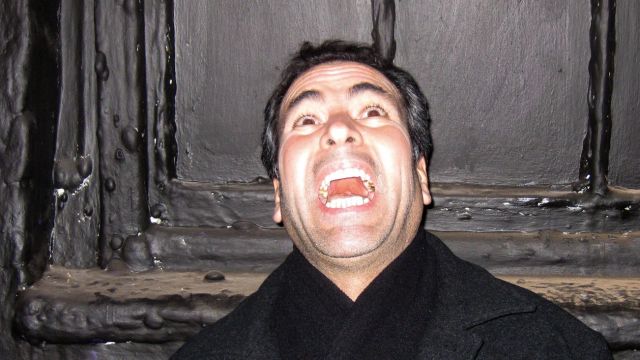If, as … and Stranger in the Corridor.
For people who like their theatre about refugees making new lives for themselves in Australia to be mostly variations on the theme of how ‘they’ can be more like ‘us’, then Mr Aidani’s powerfully brutal ode to the despair associated with a disintegrating mind desperate for comfortingly familiar reference points is not going to be your chai latté.
The mandatory detainment of asylum seekers is a controversial and internationally-criticised ‘policy’ of consecutive Australian Governments (from every philosophical spectrum) and in our reckless and self-serving political climate, it is difficult to separate these acts of governmental-ordained discrimination from the act of theatre-making. In a country that steadfastly and blindly refuses to acknowledge the essence of humanity and difference, the cultural relevance of the act of theatre-making assumes a profoundly necessary responsibility.
Consider this statement: “A boat-load of Sri Lankan Asylum-seekers”. Eerily familiar, isn’t it. Why? Because somewhere, in the favoured national fortress-like psyche, and a lazy, time- and resource-poor media, it is simply too complex to even begin to address the truth of the issues regarding refugees: which is that every person onboard that boat is a human being – a human being who has witnessed and experienced acts of torture, horror and destruction, to the extent that their only choice is to board a leaky boat and sail across the sea to a faraway island where, they hope, their lives will be better. There is a point, one might imagine, where the issues of refugees must become less about some kind of abstract scorecard (in the same way in which one year’s road toll competes with another’s) and more concerned with humanity.
The act of making theatre, especially as a result of its very close proximity to us at La Mama (and in Mr Jones’s ‘V-shaped corridor’), has the power to engage specifically with explorations of humanity – the psychological aspects of curiosity and fear we all share. And these two short plays currently on at La Mama are, make no mistake, powerfully illuminating theatre.
Mr Aidani’s two short extraordinary plays make immensely powerful statements about what is at stake for the human condition and the act of mental and emotional endurance. Directed by La Mama Elder, Lloyd Jones (who can trust a text to flower like few directors I know), our senses are starved of visual feeders, and instead, it is Mr Aldani’s words that take us through the stark reverie of a shell-shocked mind, and a once-abundant imagination struggling to filter and finally determine the truth and newfound relevance of haunting memories of colour, people, music and familiar sounds: the “invisible story”.
Every word is sacred, highlighting the fascinating juxtaposition of the first (If, as …) to the second (Stranger in the Corridor), where we are left contemplating which of the two male characters in the second play might be the male character in the first. Unless, of course, 'he' is 'us'.
In the first play, Mr Jones also makes a typically pertinent design statement about the occasional futility of language and effective communication with a clever and strategically placed sign which potently highlights the pointlessness of it all and begs the question “who tells us what we should do and why?”. In the second play, the projector that never works – and, in fact, is not even assembled – is another jewel of design detail of great significance.
In spite of the text’s references to “melody”, Mr Aldani’s text and Mr Jones’s direction of it, are determinedly anti-melody – with the exception of Shahin Shafaei’s haunting singing.
Elnaz Sheshgelani and Mr Shafaei (both originally from Iran) and Majid Shokor (who was born in Iraq and who was a member of the Iraqi National Theatre Company) deliver superb, committed performances. Their undeniable unity with the text lends this performance a rare authority and an invigorating authenticity. Mr Shafaei inhabits La Mama’s tiny staircase in a way that becomes almost too painful to watch, and the analogies with the character’s situation come hard and fast. In its complicity to the text and the study of enforced inaction, it is a beautiful performance. Mr Shokor’s ‘reading’ of the text is an inspired directorial choice, and Mr Shokor rises to meet the challenge with an almost innate level of respect and wonder that becomes increasingly difficult to endure.
The text is laced with sharp, penetrating observations about the toll being trapped or enclosed in a limiting physical space takes on our imagination and will to survive it, but perhaps the most telling is this one: “I don’t have anything to prove”. Or this one: “Silence”.
Some years ago in Sydney I met an Iraqi refugee who, while in detention, had sewn his lips together. Today, I am a little closer to understanding why. That is the power of theatre.
Geoffrey Williams
Subscribe to our E-Newsletter, buy our latest print edition or find a Performing Arts book at Book Nook.

